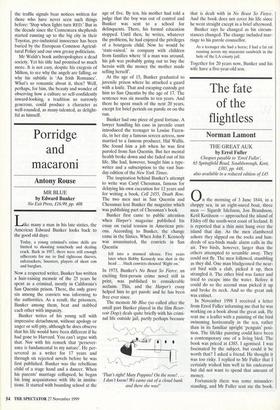Porridge and
macaroni
Antony Rouse
MR BLUE by Edward Bunker
No Exit Press, £16.99, pp. 408
Like many a man in his late sixties, the American Edward Bunker looks back to the good old days:
Today, a young criminal's crime skills are limited to shooting somebody and dealing crack. Back in 1957, there were still enough adherents for me to find righteous thieves, safecrackers, boosters, players of short con and burglars.
Now a respected writer, Bunker has written a hair-raising memoir of the 25 years he spent as a criminal, mostly in California's San Quentin prison. There, the only grave sin among the convicts was informing to the authorities. As a result, the prisoners, Bunker among them, beat and stabbed each other with impunity.
Bunker writes of his young self with impressive detachment, without apology or anger or self-pity, although he does observe that his life would have been different if he had gone to Harvard. You can't argue with that. Nor with his remark that 'persever- ance is fundamental to my nature'. He per- severed as a writer for 17 years and through six rejected novels before he was first published. Bunker was the rebellious child of a stage hand and a dancer. When his parents' marriage collapsed, he began his long acquaintance with life in institu- tions. It started with boarding school at the age of five. By ten, his mother had told a judge that the boy was out of control and Bunker was sent to a school for delinquents. There, his formal education stopped. Until then, he writes, whatever the problems, he had enjoyed the privileges of a bourgeois child. Now he would be 'state-raised,' in company with children from families where 'if a man was around, his job was probably going out to buy the heroin with the money the mother made selling herself'.
At the age 01 15, Bunker graduated to juvenile prison where he attacked a guard with a knife. That and escaping custody got him to San Quentin by the age of 17. The sentence was six months to ten years. And there he spent much of the next 20 years, except for brief periods on parole or on the run.
Bunker had one piece of good fortune. A lawyer handling his case in juvenile court introduced the teenager to Louise Fazen- da, in her day a famous screen actress, now married to a famous producer, Hal Wallis. She found him a job when he was first paroled from San Quentin. But her mental health broke down and she faded out of his life. She had, however, bought him a type- writer and a subscription to the vast Sun- day edition of the New York Times.
The inspiration behind Bunker's attempt to write was Caryl Chessman, famous for delaying his own execution for 12 years and for writing a book, Cell 2455, Death Row. The two men met in San Quentin and Chessman lent Bunker the magazine which was publishing part of Chessman's book.
Bunker first came to public attention when Hatper's magazine published his essay on racial tension in American pris- ons. According to Bunker, the change came in the Sixties. When John F. Kennedy was assassinated, the convicts in San Quentin
fell into a stunned silence. Five years later when Bobby Kennedy was shot in the head ... black convicts shouted 'Right on.'
In 1973, Bunker's No Beast So Fierce, an exciting first-person crime novel still in print, was published to considerable acclaim. This, and the Harper's essay helped him to get parole and he has been free ever since.
The memoir Mr Blue (so called after the small part Bunker played in the film Reser- voir Dogs) deals quite briefly with his crimi- nal life outside jail, partly perhaps because
'That's right! Mary Poppins! On the nose! . . . I don't know! We came out of a cloud bank and there she was!' that is dealt with in No Beast So Fierce. And the book does not cover his life since he went straight except in a brief aftetword.
Bunker says he changed as his circum- stances changed. The change included mar- riage to his parole counsellor.
As a teenager she had a horse; I had a fat rat running across my macaroni sandwich in the hole of the LA county jail.
Together for 20 years now, Bunker and his wife have a five-year-old son.


























































































 Previous page
Previous page